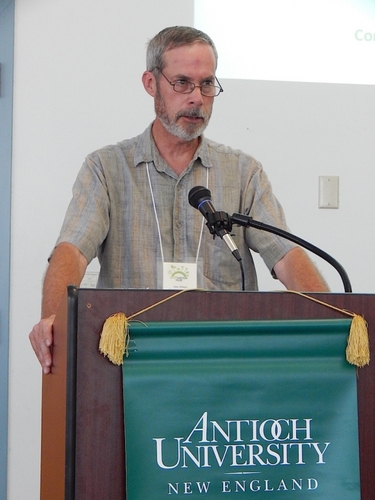Four colleges in three states are teaming up to help spark a “green” recovery from the closure of Vermont Yankee.
Administrators from the School for International Training in Brattleboro; Greenfield Community College in Greenfield, Mass.; and Antioch University New England and Keene State College in Keene, N.H. have signed an agreement to support a new “Ecovation Hub” meant to bring jobs, investment, and visitors to the tri-state area.
The schools are pledging to provide education, training, and support for a wide-ranging effort to capitalize on environmentally friendly industries and expertise. And they're looking for new ways to do that cooperatively.
“The institutions coming together are thinking differently,” said Melinda Treadwell, Antioch's chief executive officer and provost. “We are committed to thinking differently together.”
The “ecovation” name dates only to last year, but the underlying movement has roots in conversations that stretch back at least a decade in southeastern Vermont.
Brattleboro green-building pioneer Alex Wilson recalled conversations with Brattleboro Development Credit Corp. and others about how to benefit from an emerging “green economy” that emphasized resilient, sustainable buildings and communities.
Then, in August 2013, Entergy announced it would be shutting down the Vermont Yankee nuclear plant in Vernon. Economic development officials already had been planning for the plant's eventual closure, but the unexpected news kicked that process into high gear.
“That kind of got our juices flowing,” said Wilson, who now chairs the Ecovation Hub project.
The region's green economy efforts gathered speed when Brattleboro Development Credit Corp. landed a federal grant in 2015. The organization also received funding from a program created by a shutdown settlement agreement between the state and Vermont Yankee.
BDCC is still involved in the effort, but the project has expanded rapidly: In 2016, a team of public officials, business administrators, educators, and other experts created the Ecovation Hub.
The effort - which also includes a new financing mechanism dubbed “ecoF.I.R.E.” - has stretched into southwestern New Hampshire and northern Massachusetts to include “an amazing assemblage of people from three states,” Wilson said.
“The collaborations that are emerging have been really exciting to witness,” he added.
The four colleges' joint efforts are the latest example of that.
The formal name for what they've created is an “education and training consortium,” and the wide variety of proposed subject areas reflects the reach of the tri-state effort: Along with green building products and services, officials also are targeting finance, insurance, and real estate; agriculture and agroforestry; and climate-resilient communities.
Antioch is a key piece of the collaboration due to its existing Center for Climate Preparedness and Community Resilience.
“That center has dedicated immense energy to become a national leader in preparing communities for resiliency in the face of climate change,” Treadwell said.
There also are some new initiatives in the works due to the colleges' collaboration. For example, Antioch has created a graduate fellowship position “explicitly funded to sustain the Ecovation Hub,” Treadwell said.
The college also is working with Keene State to create an accelerated program in which students can earn a bachelor's degree and a master's in sustainability within five years. That is “a direct outcome of the Ecovation discussions,” Treadwell said.
At Greenfield Community College, President Bob Pura envisions developing an expanded curriculum from the campus' outdoor learning laboratory. He also said a new internship coordinator position could help place students in Ecovation-related positions.
“It's certainly good for our students, who will be learning, developing, and becoming the leaders of these initiatives as we move forward,” Pura said July 20 during an Ecovation gathering at Antioch.
“The green economy will grow,” Pura added. “It is inevitable ... why not here in our community?”
Brattleboro-based SIT brings “decades of experience in policy advocacy and international sustainable development,” administrators said. They also pointed to a recently funded solar array on campus, as well as an accompanying agricultural research project and a planned public lecture series.
John Ungerleider, an SIT faculty member, noted that more initiatives are in the works as the four-college consortium takes shape.
“The bottom line,” he said, “is getting people to come here and study.”
Abigail Abrash Walton, who has been involved in the Ecovation project and co-directs Antioch's Center for Climate Preparedness and Community Resilience, said the emphasis is on bringing together modestly sized communities and colleges to do something big.
“This is an incredible challenge and an incredible opportunity, and we are really well-poised to take advantage of this moment,” she said.
